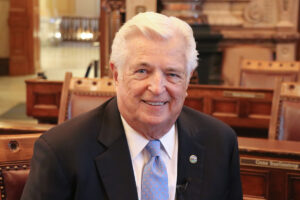Interview of Phillip Martin, August 19, 2022
Interviewed by David Webb
Phil Martin served southeast Kansas, as county treasurer, senator, appraiser and and Kansas as the Director of Property Valuation. He influenced major tax changes like reappraisal & classification and the implementation of the severance tax while in state government. In this oral history interview, he recalls people with whom he served and the issues that arose during his years of public service.








